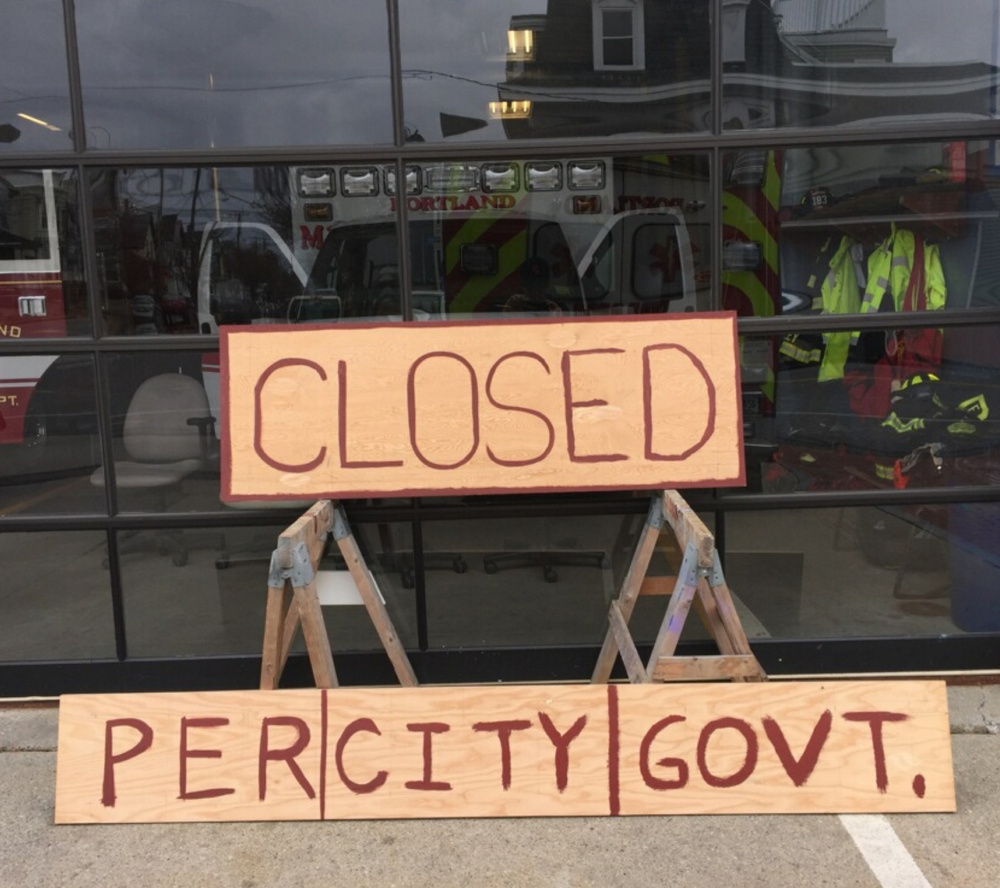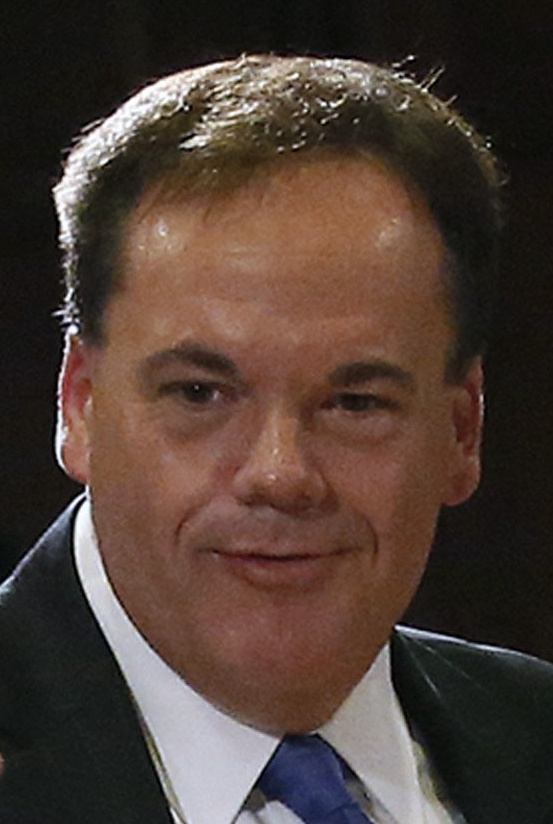Portland officials may take disciplinary action against employees after a homemade sign was posted last week in front of a Munjoy Hill fire station telling residents that it had been closed.
The city had periodically taken the station’s ambulance out of service during the overnight hours, when call volumes are the lowest, to reduce spending on overtime, apparently prompting some rank-and-file members to place a sign in front of the Munjoy Station at 134 Congress St., saying “Closed per city gov’t.”
City Manager Jon Jennings called the sign “childish” and said he is looking into whether any discipline is warranted.
Jennings said the crew did a disservice to area residents, who were led to believe the city had closed the entire station.
“What angered and disappointed me the most (is they were) giving the impression the entire station was closed,” Jennings said. “Those types of childish antics won’t stand with me being city manager. That’s just how it’s going to be.”
Meanwhile, city officials say the ambulance is expected to see regular service now that 12 new recruits have joined the Fire Department.
The incident highlights increased tensions between City Hall and firefighters, who have been trying to negotiate a new contract for more than two years. Firefighters are working under a contract that expired in 2013 and theirs is the only city union unable to ratify a new deal.
The public display of frustration within the Fire Department also manifested itself in signs placed throughout the neighborhood, asking residents to contact the city.
Although it’s unclear who placed those signs, the fire union’s social media account has been issuing public safety alerts about the department being shorthanded. On Dec. 2 a message read, “#portlandme playing with public safety.”
Some city officials say they are concerned that a temporary measure to rein in overtime costs prompted such a strong reaction, especially since the ambulance is a new addition to the neighborhood’s fire station and responds to an average of two calls a night, and the station has trained paramedics among its firefighters and backup resources about a half-mile away.
Though neither the union nor the city would comment about the areas of disagreement in the negotiations, an independent consultant who reviewed the department in 2013 deemed some contract provisions “unnecessarily excessive and restrictive,” potentially infringing on managerial rights when making work assignments and allocating resources.
STILL NO DEAL
After failing to reach a deal after two years of negotiations, the city and union negotiators drafted a compromise agreement over the summer, following two days in mediation. In November, the union rejected the deal.
John Brooks, president of the International Association of Firefighters, Local 740, said he needed to meet with union members to find out why they rejected the compromise. He declined to comment on the fire station sign, other than to say he didn’t think it had anything to do with the contract. He would not arrange an interview with the person, or people, who made it.
“From our end, I don’t think we should be taking our chances putting any type of fire equipment out of service because of budget,” he said. “We cannot afford to lose any more staff even if it’s at night.”
An analysis by the Portland Press Herald/Maine Sunday Telegram found that the department, whose authorized staffing is 234 firefighters, has more members per capita than any other medium-sized city in New England. Brooks said that analysis is misleading, because unlike other comparable cities, Portland firefighters cover the airport and islands.
He also noted that national standards call for four firefighters per truck and the city only has three.
The department is also losing 12 firefighters through attrition who were previously funded by a federal grant, which expired in October and was not renewed.
“It’s time for the city to decide what they want to provide for a service and properly fund and resource that service,” Brooks said.
Until last week, the city had been staffing the ambulance “almost exclusively” by using overtime, the budget for which was nearly exhausted only five months into the fiscal year, Jennings said.
According to city records, the department has already spent 83 percent, or $887,000, of its $1.1 million overtime budget for the fiscal year ending June 30. By comparison, the Police Department has spent about 46 percent, or $410,000, of its $888,000 overtime budget.
The idea of periodically taking the Munjoy Hill ambulance out of service from 8 p.m. to 8 a.m. to save on overtime costs had been discussed and proposed by former Fire Chief Jerome Lamoria during the previous budget year.
Interactive chart
Interactive: Christian MilNeil
Acting Fire Chief David Jackson said the high overtime costs are the result of a citywide hiring freeze instituted last year, during which the department was unable to fill positions that became vacant through turnover and retirements.
City records indicate that the Munjoy Hill ambulance has responded to 230 emergency calls since it was moved to the hill in August. Nearly half of those runs were in response to calls in that neighborhood, while 25 percent were downtown. After removing it from service, other ambulance crews were projected to have to pick up an average of two calls per night.
The ambulance had the second fewest calls of the five ambulances in the city, according to city records, which show the ambulance covering a large swath of East and North Deering responded to eight fewer calls over the 10-week period analyzed.
“This was not a willy-nilly decision,” Jackson said. “There’s true data here.”
City officials note that the firefighters on Munjoy Hill are also equipped with medical gear and are staffed with a paramedic. Also, with the 12 new recruits in the department, the so-called brownouts of Munjoy Hill will be a rare occurrence.
“As long as we continue to have firefighters to cover all required positions, the ambulance stays in service for the full 24-hour shift,” Jackson said.
CONCERNS FROM COUNCIL
Several city councilors expressed concern that a relatively modest cost-cutting measure prompted such a strong reaction from the rank-and-file members of the Fire Department, especially since the city is headed into another difficult budgeting season, where a greater percentage of city spending is being devoted to debt and pension obligation bonds, and taxpayers are already feeling the pinch.
“I sure hope it isn’t a shot across the bow every time the city tries to save a little bit of money,” said City Councilor Jon Hinck, who frequently expresses concern about the property tax rates in Portland. “To endeavor to control the ever-rising tax rates, we have to look at all the budgets. But our fire budget is amply provided for.”
The Fire Department currently has the largest budget of any city department at $16.5 million, which accounts for roughly 9 percent of Portland’s $178 million in expenditures. Meanwhile, existing debt service accounts for 20 percent, at $35.7 million.
City Councilor Edward Suslovic, who leads the council’s public safety committee and has been critical of Fire Department staffing, said the city needs to modernize how it allocates its resources and take full advantage of mutual aid agreements with neighboring cities, such as Westbrook and South Portland, which respond to calls when other units are tied up and vice-versa.
“I think a modern department gears up and gears down based on anticipated call volume and regional resources available if local services are unable to respond,” Suslovic said. “What we’re doing is what a modern fire department and EMS services do all over the country. They’re don’t have a uniform staffing level 24/7.”
Send questions/comments to the editors.





Success. Please wait for the page to reload. If the page does not reload within 5 seconds, please refresh the page.
Enter your email and password to access comments.
Hi, to comment on stories you must . This profile is in addition to your subscription and website login.
Already have a commenting profile? .
Invalid username/password.
Please check your email to confirm and complete your registration.
Only subscribers are eligible to post comments. Please subscribe or login first for digital access. Here’s why.
Use the form below to reset your password. When you've submitted your account email, we will send an email with a reset code.